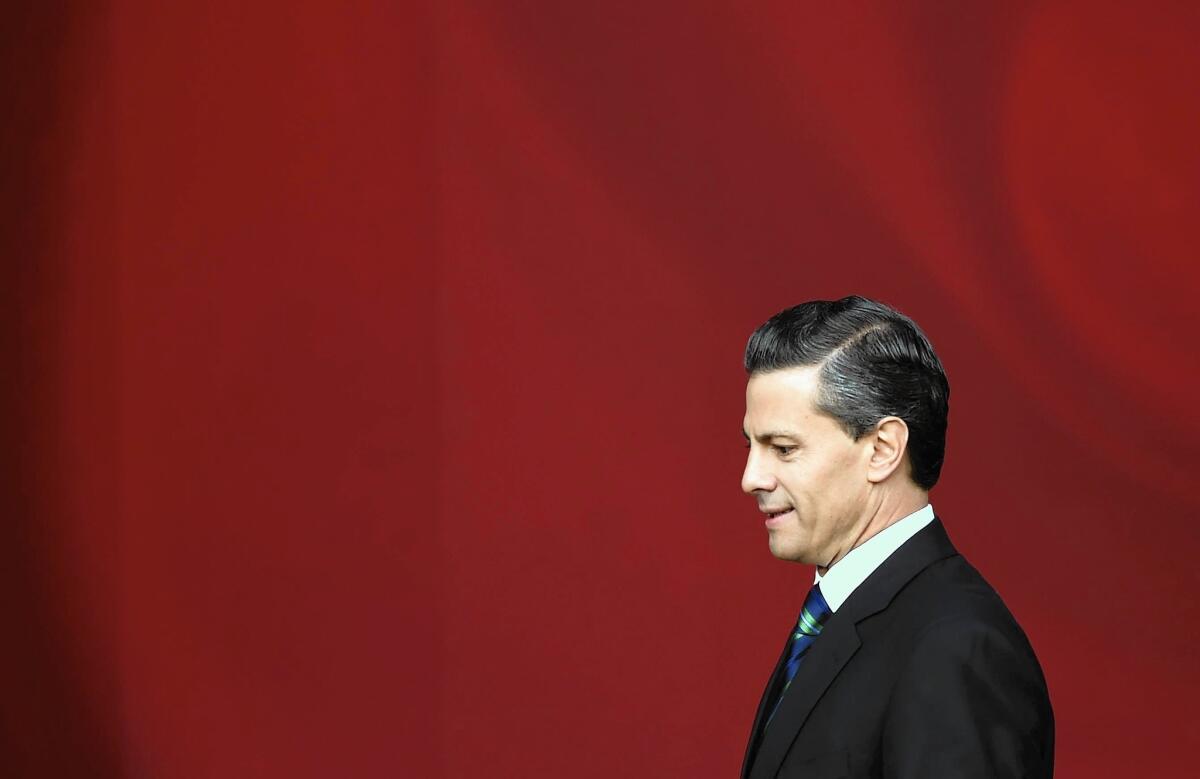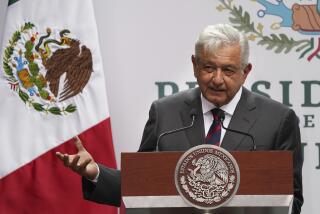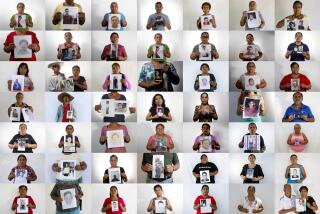Mexico president’s approval plunges over scandals, missing students

Two years after assuming office, and as protesting Mexicans again took to the streets Monday, President Enrique Peña Nieto has the lowest approval rating of any Mexican chief executive in nearly two decades, a new poll says.
The survey, published Monday by the prominent Reforma newspaper, indicated Peña Nieto’s popularity had fallen 11 percentage points in the last four months to an all-time low of 39%, with 58% disapproving of his administration. Another poll in the newspaper El Universal showed a smaller plummet but still put the president’s approval rating at 41%; it was nearly 70% when he was inaugurated.
Although opinion polls are notoriously unreliable in Mexico, the results seemed to jibe with a generalized air of anger in the country, fueled by the presumed massacre of 43 missing college students by police and a drug gang, and a number of controversies involving possible conflicts of interest by the president and his family.
Moreover, Peña Nieto and his staff, once seemingly Teflon-deft at orchestrating image and PR, now appear to be floundering. Billed as a major speech to reinvigorate the government, Peña Nieto’s address last week, in which he offered a 10-point plan on security and other matters, has not seemed to garner him fresh support.
“The poll numbers don’t surprise me,” Denise Dresser, a Mexican political analyst and fervent critic of the government, said in a talk-radio panel. “What surprises me is a government that doesn’t know how to react, that faced with a crisis doesn’t know what to do.”
The Reforma poll, conducted through at-home interviews of 1,020 adults over a three-day period last month, noted that Peña Nieto’s ranking was the worst for a sitting president since the 1995-96 period when then-President Ernesto Zedillo battled severe economic crisis and fallout from a major devaluation of the peso.
Meanwhile, the first day of Peña Nieto’s third year in office was looking a lot like the first day of the first year: Thousands of people were demonstrating against the government in the capital and in dozens of cities across the country. Today’s demonstrations, however, seem different: larger, more broad-based.
Among those planning to march Monday were several demonstrators released from prison over the weekend. They had been detained in a Nov. 20 protest, sent to maximum-security prisons and finally freed on a judge’s order that cited lack of evidence. They said they would continue protesting despite what they described as brutal treatment by police forces.
“They threatened us, told us they would kill us, make us disappear,” Luis Carlos Pichardo, a filmmaker, said in a radio interview.
“I’ve never been beaten that badly,” said Juan Daniel Lopez, 18, a student. “It was brutal.... I was shouting, ‘No to violence!’ when they surrounded me, kicked me and took me away.”
Peña Nieto’s election in 2012 returned his Institutional Revolutionary Party, or PRI, to the nation’s top office after a 12-year hiatus. Before that, the party had governed virtually unchallenged for seven decades, routinely co-opting or repressing most opposition. The president was all-powerful, and corruption was the rule of the day.
Peña Nieto promised a “new PRI”: professional, transparent and modern. But the latest controversies are challenging that promise.
Many Mexicans perceived him to have been late, aloof and sloppy in his handling of the case of the college students missing and widely believed to have been killed in Guerrero state. The former governor of Mexico state has yet to fully explain what many see as an especially cozy relationship with a contractor who has won hundreds of millions of dollars in projects from Peña Nieto governments, while also lending or building mansions for him or his wife.
Presidential spokesman Eduardo Sanchez, in a meeting last week with the international press, said the relationship with the contractor did not represent a conflict of interest because the president has no role in bids for public works.
Peña Nieto and his aides had hoped the 10-point plan announced last week, which would overhaul local police and change judicial institutions, would appease an enraged public. Instead, the plan and Peña Nieto’s failure to admit errors have been widely criticized.
Aurelio Nuño, the president’s chief of staff, defended the government’s “new agenda,” saying the administration understood and shared “the consternation and indignation” of Mexican society.
“There is a spirit of recognition that we had fallen short in the agenda of rule of law,” Nuño said. “You don’t need opinion polls to know that.”
Asked if the current crisis might not wipe out the administration’s gains, Nuño said: “Quite the contrary. In two years we put forward an agenda of reform … not seen in 15 years.”
“These have not been two years wasted,” he said. “These have been two years taken advantage of like never before.”
Cecilia Sanchez of The Times’ Mexico City bureau contributed to this report.
More to Read
Start your day right
Sign up for Essential California for news, features and recommendations from the L.A. Times and beyond in your inbox six days a week.
You may occasionally receive promotional content from the Los Angeles Times.







